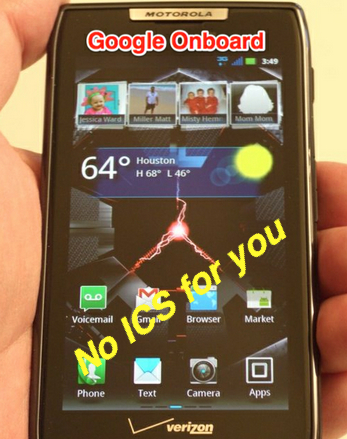First test for Googlarola: ICS updates


See also: CNET: Google closes $12.5B deal | A daunting to-do list ahead | Google: We now own Motorola Mobility | Android tablet surge will be led by Google-Motorola, HP, Dell | The tablet revolution is coming
Literally just days before the merger was finalized, Motorola published a detailed list of its phones and noted which ones would be getting an update to Ice Cream Sandwich (ICS), the current version of Android. More importantly Motorola admitted which phones would not be getting ICS, and gave the reason that ICS required the best hardware components to handle it.
“We work very closely with Google and cell phone carriers for every software update. And, obviously we want the new release to improve our devices. If we determine that can’t be done—well then, we’re not able to upgrade that particular device.”
This sent Motorola phone owners into a tizzy, although it was relatively quiet given the small number of them. The admission that ICS was hard on phones was in effect a slap in the face of Android. There has been lots of speculation that ICS updates must be hard to do given how few phones have received it. We even publicly questioned why it was so hard to put ICS on phones, even Google's own Nexus line.
Now that Google has taken over at Motorola, even though it claims it will keep the operation separate, with Jelly Bean about to be announced Google better get ICS in order. It would be in Android's best interest for Google to sit down with Motorola and revamp that phone update list for ICS, and get all recent handsets on a timetable for the update. Google needs partners to get moving quicker with updates, and it better start with cleaning its own house.
It's bad enough that the phones that will get ICS from Motorola won't do so before the last half of this year. Throw in recent phones like the Droid 3 that won't get it at all and if you are Google you have a situation on your hands. Jelly Bean will be announced this summer, and virtually all of Google's own phones will not even be running ICS.
Very few Android phones have ICS, and once Jelly Bean gets released the vast majority of phones will be at least two versions behind. Owning Motorola gives Google the advantage over all partners, with control over the OS, all software, and the Motorola hardware. There is no excuse for Motorola phones to not have at least ICS onboard, and Google better make this a high priority post-merger.